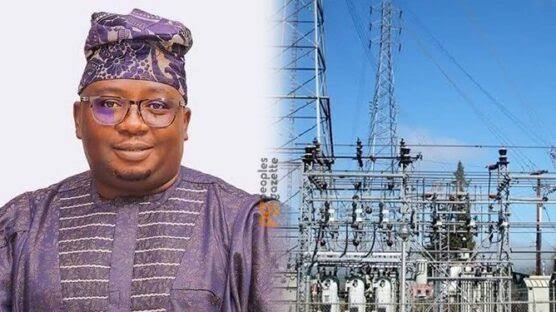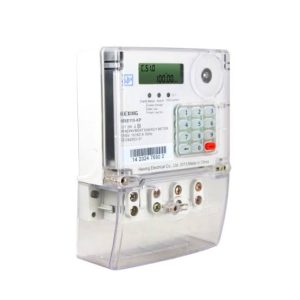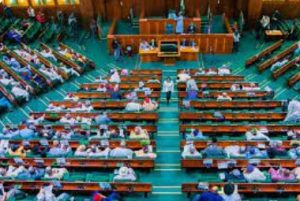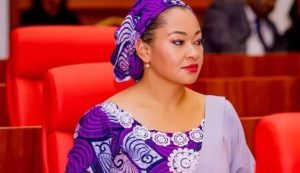By Damilare Adeleye
Despite the recent electricity tariff increase officially for consumers categorised under Band A, Nigeria’s power supply still remains epileptic as a result of incessant national grid collapses, Sparklight News can report.

In April 3, 2024, the federal government through Nigerian Electricity Regulatory Commission (NERC) announced a raise in electricity tariff by 300 per cent for Band A consumers in the country.
In a document released by the commission titled “Eligible Customer Regulations 2024” signed by Its Chairman Sanusi Garba, various power distribution companies (DisCos) were granted approval to raise electricity prices from N68 to N225 per kilowatt-hour effectively from April 1, 2024.
According to Musliu Oseni, NERC vice-chairman, the high rate would only affect 15 per cent of the electricity customers tagged as ‘Band A’ who would receive a minimum of 20 hours power supply daily beyond the varying allocations for other band classifications.
However, despite the upward review of the tariff, which has already been implemented for nearly all consumers, electricity is yet to be stable in the country due to frequent national grid collapse.
It was gathered that the national grid has collapsed over 10 times in 2024, plunging major parts of the country into darkness each time.
The timeline of Nigeria’s national grid collapses recorded in this year include February 4, 2024, March 28, 2024, April 15, 2024, July 16, 2024, August 5, 2024, October 14, 2024, October 15, 2024, October 19, 2024, November 5, 2024 and most recently November 7, 2024.
During these collapses, which were most times described as partial setbacks and little disturbances, Nigeria suffered widespread outages, affecting businesses and hindering several services across the country.
While speaking sometimes in October, the Minister of Power, Adebayo Adelabu, cited the deplorable state of the country’s power infrastructure as a reason for the ‘inevitable’ national grid collapse.
The Minister, who stated that power grids in different regions or states are needed to prevent incessant grid collapses, noted that having multiple power grids in each region and state would bring about electricity stability.
“This Electricity Act has decentralised power. It has enabled all the subnational governments, the state government and the local government, to be able to participate in the generation, transmission, and distribution of electricity.
“We all rely on a single national grid today; if there is a disturbance of the national grid, it affects all 36 states. It shouldn’t be like that. This will enable us to start moving gradually towards having regional groups and possibly having state grids.
“And each of these grids will be removed and shielded from each other. So, if there’s a problem with a particular grid, only the state where it belongs will be affected, not the entire nation. So, this is one of the impacts this Electricity Act will have,” Adelabu was quoted as saying.
Meanwhile, following the last week grid collapse, many Nigerians berated the situation, while some called on the government to address the persistent problem with all measures necessary.
Mr Philemon Akinlolu Olowu, a digital creator, questioned the rationale behind tariff increase when issues disturbing the power grid were still unresolved.
“Could someone please explain why things can’t be set up correctly before implementing new laws or raising tariffs? In other countries, they make sure their electricity systems are stable, with consistent power supply, before introducing new policies. But here in Nigeria, it seems like it’s always the other way around. We’re expected to accept new tariffs and policies, even while our power supply remains unreliable and insufficient.
“It’s hard not to feel disheartened, as if the country is stuck in a cycle that prevents real progress. Every single day seems to bring more bad news, and it’s honestly exhausting. May God have mercy on this country because it feels like we are struggling to make the strides that should be possible,” he commented.
Reacting via his X (formerly known as Twitter), Inibehe Effiong, a human rights lawyer, described the grid collapse as embarrassing and worrisome.
“The so-called National grid has collapsed yet again. The frequency of the collapse is embarrassing and worrisome.
“Nigeria has not been able to provide stable and sufficient electricity for its people, decades after independence from British colonial rule. The internal colonialists have destroyed the country. As usual, no one will be fired or punished for the reoccurring collapse of the national grid,” the legal practitioner remarked.
Also, an X user identified Mark Makele (@SPORTDISCIPLE), lamented the development, adding that such situation warranted the sacking of the minister of power.
In his words, “In a sane situation, the minister of power should be out of office by now with this incessant National Grid collapse. But no, we’re in a country that everything goes. Nigeria was a country.”
Similarly, an economist, Dr Paul Alaje, who bemoaned the grid collapse despite tariff hike, asserted the need for huge investments in the sector by operators to solve the puzzle bedeviling the sector.
He said, “This ‘Band A’ and the national grid collapse: It is like patching a badly damaged tyre. The promise of providing a constant, dependable, and quality power supply dates back to over a decade ago after deregulation. We were told that once the tariffs are higher, all will be well.How can it be well when power generated cannot be sufficiently distributed? It is one story of grid collapse or the other.
“This 2024 alone, we have had an average of one collapse a month. The sector grossly suffocates due to insufficient investments. The strategy of using revenues collected from the consumers as part of investment does not work for this kind of sector. There have been several increases yet, electricity is still generally epileptic and unreliable. I understand the president has signed a bill that allows the subnationals to participate, but how many have invested in this sector? Despite revenue surges at FAAC, poverty and hardship are ubiquitous at those levels. A nation’s level of electricity is directly proportionate to its level of poverty or prosperity. Do we want Nigeria to develop?”
“One thing MUST be settled, electricity. It must be high in both quantity and quality. The task, therefore, would be to find much-needed investments by tasking operators to do more.The recent increment in tariff has largely been transferred to the final consumers. This already impacts Nigeria’s inflation figures, which stood tall at above 30% y/y,” Dr Alaje added.
On his part, Aminu Yahaya, identified Aging power infrastructure, vandalism, inadequate gas supply, transmission line faults, inadequate maintenance, demand-supply, among others as main causes of grid collapse.
He said, “Aging Power Infrastructure: Nigeria’s power infrastructure is outdated and can’t handle the increasing demand for electricity. Vandalism: Vandalism of power transmission lines and equipment is a significant problem, causing frequent disruptions to the power supply. Inadequate Gas Supply: Most of Nigeria’s power plants run on gas, but the supply is often inadequate, leading to power shortages.
“Voltage Instability: The national grid is highly vulnerable to voltage instability, which can cause system collapses. Transmission Line Faults: Faults in the transmission lines can lead to a cascade of failures, causing the entire grid to collapse. Lack of Spinning Reserve: Nigeria lacks sufficient spinning reserve capacity to respond to sudden changes in electricity demand or supply. Inadequate Maintenance: Poor maintenance of power plants and transmission infrastructure contributes to the frequency of grid collapses. Demand-Supply Imbalance: When electricity demand exceeds supply, the grid can become unstable and collapse.”
He added that to mitigate the problem of reoccurring grid collapse, “Nigeria needs to invest in upgrading its power infrastructure, improving maintenance, and increasing its energy supply.
Meanwhile, on the heel of the collapse of the national grid, the Minister for Power, Adebayo Adelabu, has recently ordered the immediate replacement of aged equipment within six months as part of the recommendations to stop the ugly incident.
It was gathered that an investigative panel set up by the federal government revealed, in its report on Wednesday, that a poor maintenance culture and inadequate and aged equipment, among other challenges, are the underlying reasons for the incessant multiple collapses of the national power grid.
The panel consequently made recommendations targeted to be achieved in one month, six months and one year timelines.On the short-term (one month), the recommendations include a review of relaying philosophy and settings, particularly at critical nodes, capacity development for maintenance/System Operation staff, Testing existing equipment at the critical nodes to establish reliability, developing framework and adopting reliability-centred maintenance and Identifying critical ongoing projects for speedy completion (low-hanging fruits).
On the six months basis, the recommendations include strengthening relay coordination, replacement of aged and obsolete equipment, enhancing Supervisory Control and Data Acquisition and telecommunication tools, developing a framework to attract private investment across the value chain, deploying IoT devices on generating units and transmission lines, and secure firm gas contracts.
Other recommendations are developing and implementing measures to combat vandalisation and energy theft, developing measures to reduce transmission loss factor and aggregate technical, commercial and collection loss, human capacity development, Installation of harmonics filters by DisCo and GenCo customers, Decentralisation of TCN central store, enforcement of Free Governor Mode of Operation and the removal of ad-lash taped optic fibre.
In its one-year target, the committee recommended enhancing the distribution network and capacity, promoting decentralized grid management, implementing full SCADA and Telecommunication upgrades across the network, modernising grid infrastructure (Smart Grid), promoting and adopting the use of the ring fenced network, replacing aged and obsolete equipment, integration of renewable energy resources, replacement of ad-lash taped with OPGW and intense human Capacity Development.
Subsequently, the Minister of Power has directed the Transmission Company of Nigeria and all other relevant agencies of the ministry to begin the immediate implementation of the recommendations of the inter-agency committee.
“The recommendations of the committee are far-reaching and will proffer lasting solutions to the incessant power grid collapses that we have embarrassingly witnessed in the country in the immediate and long term,” the Special Adviser to the Minister on Strategic Communications and Media, Bolaji Tunji, stated in a statement issued on Thursday.


























